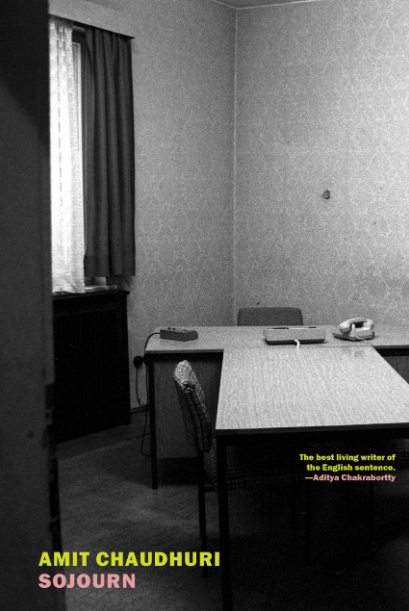A Book Review of Sojourn by Amit Chaudhuri
Amit Chaudhuri’s latest novel, Sojourn, published in August 2022, offers us a narrative that has memory as its central character. Even though the story anchors the perspective of an Indian professor who visits Berlin to lecture at a local university, its core is built in its treatment of how objects and people, places, and presence are remembered.
As the protagonist explores the city of Berlin with Faqrul, a Bangladeshi poet, it is revealed that this was not the narrator’s first visit to the place. The narrator’s mind still echoes with the memories of his previous visit as well as the memories of a distant abstract past and they come in conflict with his present. The narrator gets to know more people around among whom Gerta, Geeta Roy, Simons, and, most important, Birgit, intrigue him to such an extent that his memories subdue in his unconscious and his consciousness takes a turn, oscillating between unknown extremes. Birgit, however, impacts his life the most but he finally bids her goodbye deciding to resort to his memories where he doesn’t care about the apparent representations of people and places that give them their identity but about how they stay in his mind.
In the beginning, the narrator talks about how he feels to have thought Kenzaburo Oe had occupied the same room he is occupying now, which is suggestive of a memory not born within a man but imposed with referential images on him. Chaudhuri, even more explicitly, talks about the formation of such a memory through images identified with reference to the images they are made to carry when the narrator starts discovering Dahlem. Chaudhuri writes:
You don’t make such distinctions on arrival; they’re reported to you. They sink in; you think, ‘They’re right.’
Facing a distant memory during the present finds an expression when the narrator sees a photograph of a nude woman exhibited back in 1923 and decides not to keep it distant but to take it as a relevant experience of his own time— “1923 meant nothing; the woman was in a ‘now’ and all else was irrelevant.”
In a particular chapter where the narrator speaks about Gerta, the lady who comes to clean his flat on Fridays, Chaudhuri elaborately explores how symbols, people, and memories are interrelated to an extent that the metaphoric axis of the unconscious becomes functional. The narrator says, he has deduced, Gerta is from East Germany. The narrator then remembers, on his previous visit, he was taken to Kreuzberg where he saw “prefabricated flats” with bright blue balconies. The narrator further writes, on Gerta’s arrival, he would think of those blue buildings which may further lead the reader to see at this particular point how the narrator fixes something in his mind for what signifies it, both existing individually but not connected unless the narrator connects them. For a better understanding, it might be stated, Gerta becomes an image for the Easterners who lived in those blue buildings in Kreuzberg as well as the narrator’s memories of them when he visited Berlin for the first time, and Gerta replaces the Easterners and evokes within the narrator all that was associated with them—primarily the blue buildings, and then Kreuzberg and even many other things his previous visit encompassed.
A bit of deviation from this very point of view is required while writing about how the narrator in one place directly touches upon the idea of language and meaning forming not just out of words uttered, but out of the interrelation between the words, and what they inherently mean to both the speaker and the listener belonging to one particular language-speaking community. Chaudhuri writes:
They go on about the rebarbative sound German makes, but individual words and names have greater beauty–more history–than English can carry. I entered Hackescher Markt in my mind’s eye five or ten minutes before reaching there. ‘Friedrichstrasse’ had come up in a dream recently, as a port of arrival. Kristallnacht was transparent, broken. I woke up to words and didn’t bother with the language.
The memories of the narrator are in some places contrasted with the memories of Faqrul who remembers things on a very tangible level. His exile from his country, his encounter with the neo-Nazis in Germany, and his thoughts regarding the living memories of the War are in direct contradiction to how the narrator chooses to internalize his memories and thoughts superimposed with, again, the memories of the War. His feeling completely lost in KaDeWe is a precursor to his forming an idea about his familiarity and identification with Berlin. The narrator twice refers to infinite darkness— “…I looked deep into the forest. That is what home was: this green darkness. We’d all belonged there.” And, “I find myself on a bridge, looking below to where I came from, then ahead to where the bridge continues.”—which might be his distant past, the resultant reaction of his interaction with the memories of the War, his bearings in where he has come from or might be his spaces to fall back upon before he finds a home in Berlin, a point where Chaudhuri writes:
…I’d say the world I belonged to, the one I came from, has little veracity anymore. It began to vanish in the eighties and nineties. I don’t feel lost in Berlin—here, I’m in the present.
Birgit is introduced through email—words written by her become “the self”. “I studied the email as if it were her. I extrapolated later her appearance from the message’s shape.” Ideating a person on a psychological level from their words hints at an ensuing association between two people which may eventually lead to something special for at least one of them. Birgit’s influence on the narrator starts increasing, and after a point, the narrator starts believing what he wished for his life were to be close to Birgit and anything she stands for—taking over everything that constituted his mind and his memories previously. “It reminded me—what could it remind me of? This wasn’t my history. But I felt an intimacy, an undecidedness, that had to do with her being nearby.” To contextualize their dance in a ballroom. It’s in this same ballroom the narrator starts internalizing what he experiences and is haunted by what he believes preceded them when he was presumably not present—“The chairs looked back at me. There are spaces in which you sense time, but also inhabit the viewpoint of those who’ve already been there. You see through the eyes of those who’ve gone. These perspectives are intense but momentary.”
Do the lines, “As soon as I go into the tunnel, the sky disappears. I become confident,” actually suggest his lack of confidence was due to the knowledge, and what he is clinging onto is transient, or do they suggest, the darkness is, once again, a space for the narrator to fall back upon as has been mentioned above?
Towards the end of the novel when Birgit turns a very important character, her temporal absence is replaced by her appearance in the narrator’s memories. In the end, Birgit alone exists in the narrator’s memories becoming a metaphor of sorts for his sojourn while the other ‘signifiers’ of the stay turn into ambiguous relics of the present.
What makes Sojourn a fine work of literature probably lies in the way Chaudhuri successfully carves layered characters sometimes by their presence and sometimes by absence—some appearing more, some less, and some never appearing at all; and how he renders myriad layers to the memories of war and affection that emerge as a pervading trope alive against the backdrop of the foreign land of Berlin.
Also, read an interview with Hindi and Urdu translator Rakhshanda Jalil, in conversation with Rituparna Mukherjee, and published in The Antonym:
The Personal Is Political: In Conversation With Rakhshanda Jalil
Follow The Antonym’s Facebook page and Instagram account for more content and exciting updates.



























0 Comments